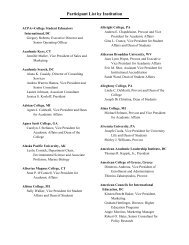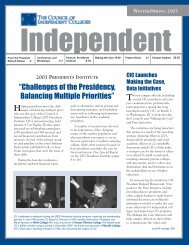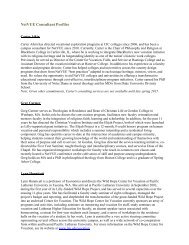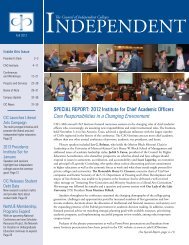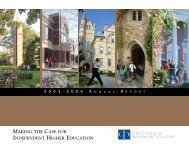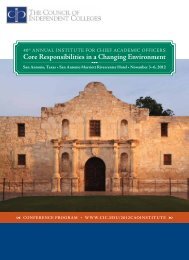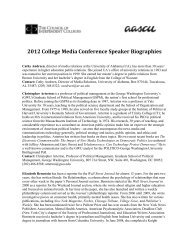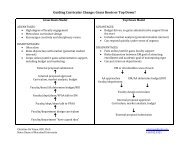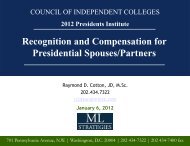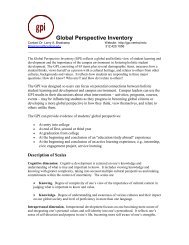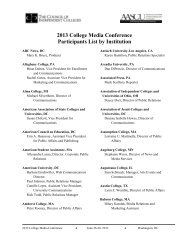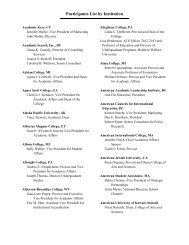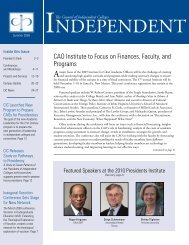Philip Acree Cavalier, Eureka College (IL) - The Council of ...
Philip Acree Cavalier, Eureka College (IL) - The Council of ...
Philip Acree Cavalier, Eureka College (IL) - The Council of ...
You also want an ePaper? Increase the reach of your titles
YUMPU automatically turns print PDFs into web optimized ePapers that Google loves.
PRESIDENT’S DESK<br />
BOaRD OF DIRECtORS<br />
Executive Committee<br />
George E. Martin, St. Edward’s University (Chair)<br />
S. Georgia Nugent, Kenyon <strong>College</strong><br />
MaryAnn Baenninger, <strong>College</strong> <strong>of</strong> Saint Benedict<br />
James M. Dennis, McKendree University<br />
Beverly Daniel Tatum, Spelman <strong>College</strong><br />
Linda N. Hanson, Hamline University<br />
Kurt Kuehn, UPS<br />
Richard Ekman, <strong>Council</strong> <strong>of</strong> Independent <strong>College</strong>s<br />
(Ex Officio)<br />
Directors<br />
Stephen Briggs, Berry <strong>College</strong><br />
Jack P. Calareso, Anna Maria <strong>College</strong><br />
Ronald L. Carter, Johnson C. Smith University<br />
Christina R. Cutlip, TIAA-CREF<br />
William L. Fox, St. Lawrence University<br />
Michael Gilligan, <strong>The</strong> Henry Luce Foundation<br />
Nancy Oliver Gray, Hollins University<br />
Sharon D. Herzberger, Whittier <strong>College</strong><br />
Christopher W. Kimball, California Lutheran<br />
University<br />
Norval C. Kneten, Barton <strong>College</strong><br />
Michael Lomax, United Negro <strong>College</strong> Fund<br />
William T. Luckey, Jr., Lindsey Wilson <strong>College</strong><br />
Sherry Magill, Jessie Ball DuPont Fund<br />
Ellen McCulloch-Lovell, Marlboro <strong>College</strong><br />
Jay McGowan, Bellarmine University<br />
Lex O. McMillan III, Albright <strong>College</strong><br />
Carol Ann Mooney, Saint Mary’s <strong>College</strong> (IN)<br />
Christopher B. Nelson, St. John’s <strong>College</strong> (MD)<br />
Erik O. Nielsen, Franklin <strong>College</strong> <strong>of</strong> Switzerland<br />
Kathleen Owens, Gwynedd-Mercy <strong>College</strong><br />
Jerold Panas, Jerold Panas, Linzy & Partners<br />
Douglas Penner, Kansas Independent <strong>College</strong><br />
Association & Fund<br />
Haywood Strickland, Wiley <strong>College</strong><br />
Jo Young Switzer, Manchester <strong>College</strong><br />
John B. Wilson, Independent <strong>College</strong> Fund <strong>of</strong><br />
New Jersey<br />
Eileen B. Wilson-Oyelaran, Kalamazoo <strong>College</strong><br />
2 Independent | Summer 2011<br />
Addressing National Priorities<br />
in Assessment by Richard Ekman<br />
everyone in higher education has surely gotten the message<br />
by now that important components <strong>of</strong> “the public”—state<br />
and federal <strong>of</strong>ficials, nongovernmental accrediting bodies, and<br />
prospective students and their parents—expect every college to be<br />
able to cite compelling evidence that students learn a great deal<br />
at that institution. <strong>The</strong> <strong>of</strong>ficials who are most eager to make this<br />
evidence available believe that students will wish to enroll only in<br />
colleges that can demonstrate that their graduates have undergone<br />
impressive intellectual growth over four years. <strong>The</strong> colleges that are most confident<br />
that the public is equally eager to receive this information have faith that both the<br />
government and accreditors will force low-performing institutions either to improve or<br />
to close their doors and will praise (and even reward) colleges that do exceptionally well.<br />
However, as any dean <strong>of</strong> admissions will attest, faith in a rational market goes only so<br />
far. prospective students are not idealized consumers, and political considerations <strong>of</strong>ten<br />
constrain the regulators from providing zealous protection to the public from shoddy<br />
educational practices and limit the ways in which excellent institutional performance can<br />
be rewarded.<br />
it’s worth noting that the call for greater accountability is not new. it first emerged<br />
nearly 30 years ago and the clamor has continued to grow in volume through both<br />
democratic and Republican administrations and through periods <strong>of</strong> both growth<br />
and decline in the number <strong>of</strong> high school graduates. One cannot easily blame today’s<br />
popular critique <strong>of</strong> higher education on circumstances that are sudden or on ideological<br />
or economic factors that can be shrugged <strong>of</strong>f as variable, cyclical, or beyond colleges’<br />
control.<br />
in fact, most colleges and universities have responded in good faith. to increase<br />
enrollments in order to meet a national priority for more college graduates with highquality<br />
degrees, institutions have amplified support services and raised the financial<br />
aid that is essential for significant increases in enrollment, especially <strong>of</strong> students from<br />
historically underserved segments <strong>of</strong> the population. At many private colleges and<br />
universities, the result has been a major commitment to first-generation and low-income<br />
students. Among CiC’s 600 members, fully one-third can take pride in enrollments that<br />
include 30 percent or more first-generation students. Rates <strong>of</strong> enrollment and graduation<br />
<strong>of</strong> low-income students are higher on average at small and mid-sized private colleges and<br />
universities than at large public research universities.<br />
<strong>The</strong> emphasis on accountability in measuring students’ “learning outcomes” has<br />
been easy for private colleges to embrace because the standard measures <strong>of</strong> graduation<br />
rates and cognitive growth do indicate that these colleges typically do better than public<br />
four-year colleges—and that is true when comparing all students with similar records <strong>of</strong><br />
achievement at the time <strong>of</strong> high school graduation. enthusiasm for greater accountability<br />
has been dampened, however, by the lack <strong>of</strong> follow-through on the part <strong>of</strong> state and<br />
federal governments. if private colleges do a better job and have the evidence to support<br />
those claims, why haven’t state and federal policies been reshaped to acknowledge the<br />
cost-effective role <strong>of</strong> our sector in helping state governments to provide for the education<br />
<strong>of</strong> state residents and in helping the federal government to fulfill national priorities?



